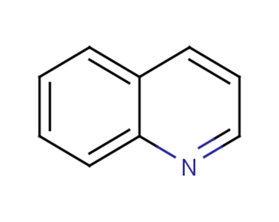
Quinoline
CAS No. 91-22-5
Quinoline( 1-Benzazine | 23-Benzopyridine )
Catalog No. M19758 CAS No. 91-22-5
Quinoline is found in alcoholic beverages. Quinoline is an alkaloid from various plant species including Mentha species. Also present in cocoa black tea and scotch whiskey.
Purity : >98% (HPLC)
 COA
COA
 Datasheet
Datasheet
 HNMR
HNMR
 HPLC
HPLC
 MSDS
MSDS
 Handing Instructions
Handing Instructions
| Size | Price / USD | Stock | Quantity |
| 100MG | Get Quote | In Stock |


|
| 200MG | Get Quote | In Stock |


|
| 500MG | Get Quote | In Stock |


|
| 1G | Get Quote | In Stock |


|
Biological Information
-
Product NameQuinoline
-
NoteResearch use only, not for human use.
-
Brief DescriptionQuinoline is found in alcoholic beverages. Quinoline is an alkaloid from various plant species including Mentha species. Also present in cocoa black tea and scotch whiskey.
-
DescriptionQuinoline is found in alcoholic beverages. Quinoline is an alkaloid from various plant species including Mentha species. Also present in cocoa black tea and scotch whiskey. Aged samples if exposed to light become yellow and later brown. Quinoline is only slightly soluble in cold water but dissolves readily in hot water and most organic solvents.
-
In Vitro——
-
In Vivo——
-
Synonyms1-Benzazine | 23-Benzopyridine
-
PathwayOthers
-
TargetOther Targets
-
RecptorOthers
-
Research Area——
-
Indication——
Chemical Information
-
CAS Number91-22-5
-
Formula Weight129.16
-
Molecular FormulaC9H7N
-
Purity>98% (HPLC)
-
SolubilityDMSO:10 mM
-
SMILESc1ccc2ncccc2c1
-
Chemical Name——
Shipping & Storage Information
-
Storage(-20℃)
-
ShippingWith Ice Pack
-
Stability≥ 2 years
Reference
1.Rüger A et al. Microbial metabolism of quinoline and related compounds. XIX. Degradation of 4-methylquinoline and quinoline by Pseudomonas putida K1.[J]. Biological Chemistry Hoppe-Seyler 1993 374(7-12):479-488.
molnova catalog



related products
-
DAOS
DAOS,Trinder's reagent, is a new type of highly water-soluble aniline derivative. It is widely used in diagnostic tests and biochemical tests.
-
Tyrosine Kinase Pept...
Tyrosine Kinase Peptide 3 [RRLIEDAE-pY-AARG], Acetylated, Amide, Phosphorylated
-
Dendrobine
Dendrobine has a slight but demonstrable analgesic and antipyretic action.Dendrobine produces moderate hyperglycemia, diminishes cardiac activity in large doses, lowers the blood pressure.



 Cart
Cart
 sales@molnova.com
sales@molnova.com


